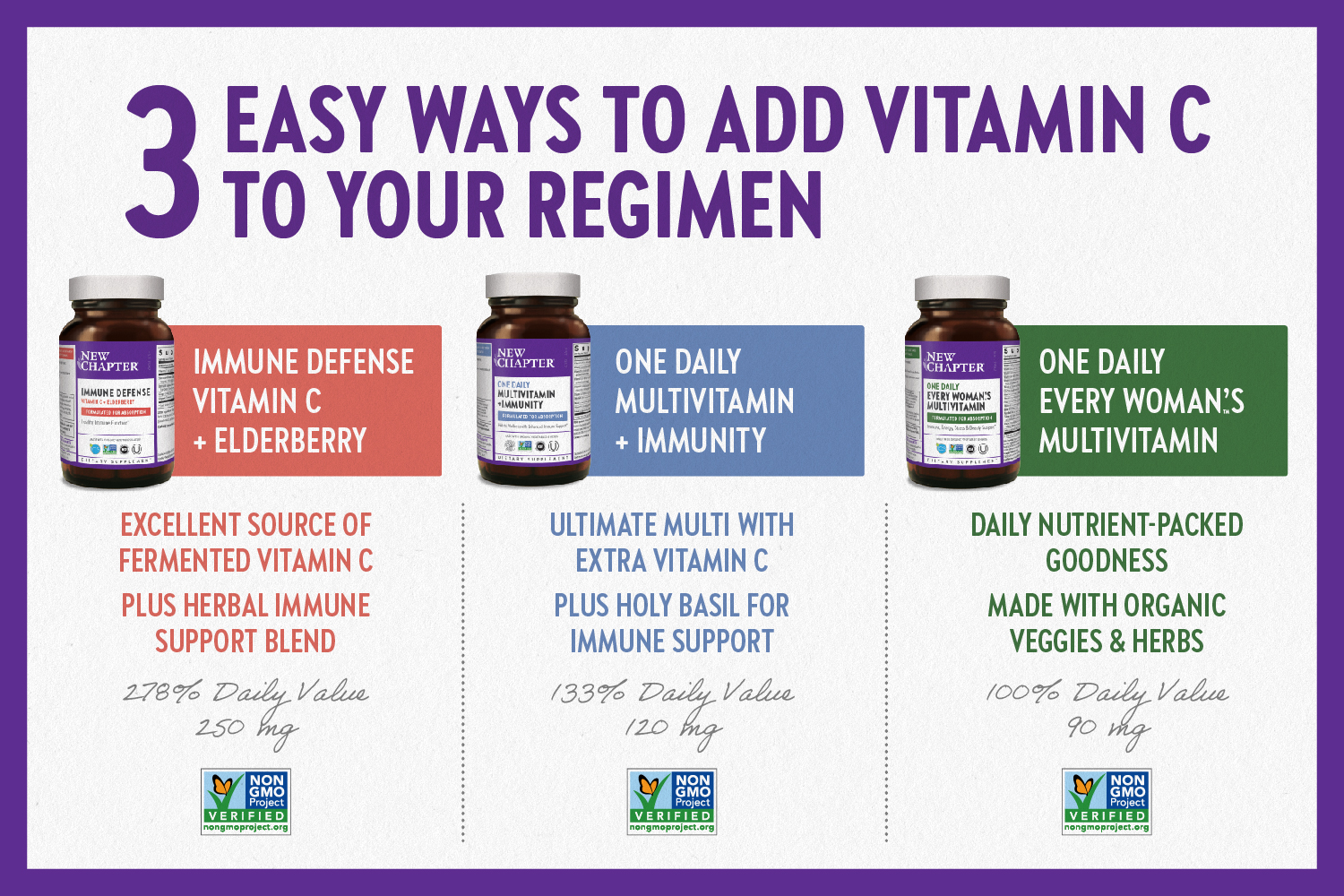Mar 11th 2022
When humans took to the sea long ago, sailors suffered from an invisible foe—a lack of Vitamin C. With no fresh food on hand, particularly fruit, mariners on long voyages developed a deficiency called scurvy, which could be fatal. By the mid-1700s, scientists started to realize that consuming fruit such as limes and lemons helped sailors prevent the problem. However, it’s only in the last 100 years that we’ve identified Vitamin C as the critical compound those sailors needed to stay healthy. In fact, every human needs C. Today, we’re lucky to know about Vitamin C and have plenty of sources for it. We’re no longer at sea about “C”! Let’s see what makes this vitamin so great.
What is Vitamin C?
So, what is Vitamin C, anyway? Is Vitamin C Calcium or another element? Is it a mineral? The truth is, Vitamin C is a chemical compound also known as ascorbic acid. It was isolated around 1930 by the Hungarian chemist Albert Szent-Györgi .
Vitamin C is a cofactor for various enzymatic reactions in the body and a powerful antioxidant. For example, Vitamin C is necessary for the creation of collagen (the essential structural component of skin and bone), L-carnitine (which plays an essential role in converting fatty acids to energy), and neuropeptides (a type of neurotransmitter). It also plays an important role in the regulation of gene expression throughout the body.
Why Do We Need Vitamin C?
Many animals make their own Vitamin C, but sadly, humans don’t synthesize their own C . Vitamin C is water soluble and not stored in the body. So, we must get it regularly from food or supplements.
Some people need extra Vitamin C, like pregnant women, smokers, and individuals recovering from surgery.
Vitamin C structure makes it quite remarkable as a fighter of free radicals in the body. Free radicals are molecules with an unpaired electron that can create ROS (reactive oxygen species). ROS in high concentrations can cause damage to cells—known as oxidative stress. Where do ROS come from? They can be a normal byproduct of functions like converting food to energy (metabolism) or the action of immune cells. They can also come from the outside environment, such as pollution or UV rays. But no matter what their origin, high levels of ROS in the body can affect cell health and slow down responsiveness to things like immune challenges. Antioxidants, particularly Vitamin C, are believed to protect cells from oxidative stress and its effects. Vitamin C does this by donating electrons to deactivate the ROS.
Benefits of Vitamin C

The benefits of Vitamin C are foundational, meaning they’re essential for life! Vitamin C supports healthy skin, immune response, and helps the body deal with the effects of stress.* Vitamin C Complex benefits are the reason why many people prefer to take a Vitamin C supplement regularly.
Immune Support
Vitamin C supports healthy immune function.* It does this by supporting immune cells and their various functions, including protecting and supporting neutrophils. Neutrophils are types of white blood cells that constantly patrol and defend the body against invaders. Researchers believe that daily Vitamin C intake helps keep neutrophils primed and ready. There’s also evidence that Vitamin C helps the body clean up after neutrophils have done their job and expired. Talk about full-service!
Collagen Protection
Collagen is a structural protein that can be affected by ROS activity. Remember how Vitamin C helps reduce ROS damage? This action helps protect your collagen, which in turn supports skin health and wound healing. Vitamin C's antioxidant action fights free radical damage in cells and protects your natural collagen for firm, nourished skin.* Vitamin C is also needed to produce collagen in the first place.
Adrenal Support
Vitamin C helps maintain adrenal gland function, which is vital for a healthy stress response.*
One more benefit: Vitamin C also helps the body absorb non-heme Iron. (Non-heme is the type of Iron from plants like leafy greens; heme Iron comes from animal sources.) This is exactly why New Chapter formulates our vegetarian fermented Iron supplement with Vitamin C.
Can Vitamin C Help with a Cold?
There is some evidence to suggest that regular Vitamin C intake may help some individuals to reduce the duration (number of days of illness) and severity of a cold. Researchers continue to study Vitamin C and how it might help with the common cold.
Food Sources of Vitamin C
Many fruits and vegetables contain Vitamin C, particularly if you eat them raw or lightly steamed. (Cooking can reduce C levels.) Vitamin C is also added to some juices and ready-to-eat cereals. In general, a healthy and varied eating pattern can be a good source of natural or even organic Vitamin C.
| Foods Rich in Vitamin C | Amount of C |
| Apple juice (1 cup) | 434 mg |
| Bell pepper (red, ½ cup) | 349 mg |
| Orange (1 medium) | 122 mg |
| Kale, scotch (1 cup raw) | 95 mg |
| Kiwi fruit (1 medium) | 180 mg |
| Mango (1 cup raw) | 325 mg |
| Broccoli (cooked, ½ cup) | 180 mg |
Sources for nutrition data: Ohio State University Extension, USDA
Why Ferment Vitamin C?
Fermenting vitamins has the remarkable ability to place an isolated nutrient into a whole-food context. Think of fermentation as a process of levelling up (rather than just breaking down). Vitamin C production usually starts with sorbitol, which is typically derived from corn. New Chapter ferments pure, non-GMO ascorbic acid (or Vitamin C) with whole foods and probiotics to deliver a Vitamin C Complex that also has added complementary herbs. Our whole-food fermented Vitamin C is formulated for absorption and also gentle even on an empty stomach.
Recommended Doses of Vitamin C
The body controls levels of vitamin C tightly. Above a certain level, the more you take, the less you will absorb. In other words, there is a limit to the peak amount of Vitamin C that your body (plasma) will carry at a time, and anything extra is excreted in urine. This is taken into account in the FDA’s recommendations for Vitamin C intake, which is 90 mg a day for adults.
Vitamin C Deficiency
Not getting enough Vitamin C can cause a condition called scurvy. In cases of scurvy, the body’s collagen breaks down and the individual is less able to heal wounds or fight off infection. Symptoms of this severe C deficiency include bruising easily, bleeding gums, and anemia.
In the United States, it is estimated that about 7.1% of people have a Vitamin C deficiency sufficient to cause scurvy. † While scurvy cases have diminished over the past few centuries, a surprising number of adults in the US have inadequate levels of Vitamin C: around 46% according to recent survey data .
Can You Take Too Much Vitamin C?
Please follow the suggested use on any Vitamin C supplements you take. You can check the product’s Supplement Facts panel and label to read the suggested use . For those wondering, “Is too much Vitamin C bad?”—the National Institutes of Health Office of Dietary Supplements says taking very high levels of C (above 2 grams per day from all sources combined) can cause issues. Talk to your healthcare provider if you have questions about extra Vitamin C.
Get the Goodness!
Here at New Chapter, it’s our mission to craft excellent quality nutrition so you can get the best support for wellness, every day. Vitamin C is so important that it’s included in all of our multivitamin blends, including our prenatal and postnatal multis. You can also boost your levels of Vitamin C with our targeted blend called Immune Defense Vitamin C + Elderberry (also known as Fermented Activated C Complex). AND we have 100% delicious Vitamin C+ gummies that deliver 125 mg of C per serving (2 gummies per day). Come explore the New Chapter family of Vitamin C products! We’re here to help you do you, WELL.

† Based on age-adjusted data from 2003–2004 National Health and Nutrition Examination Survey (NHANES). Deficiency calculated based on a serum concentration of <11.4 μmol/L










